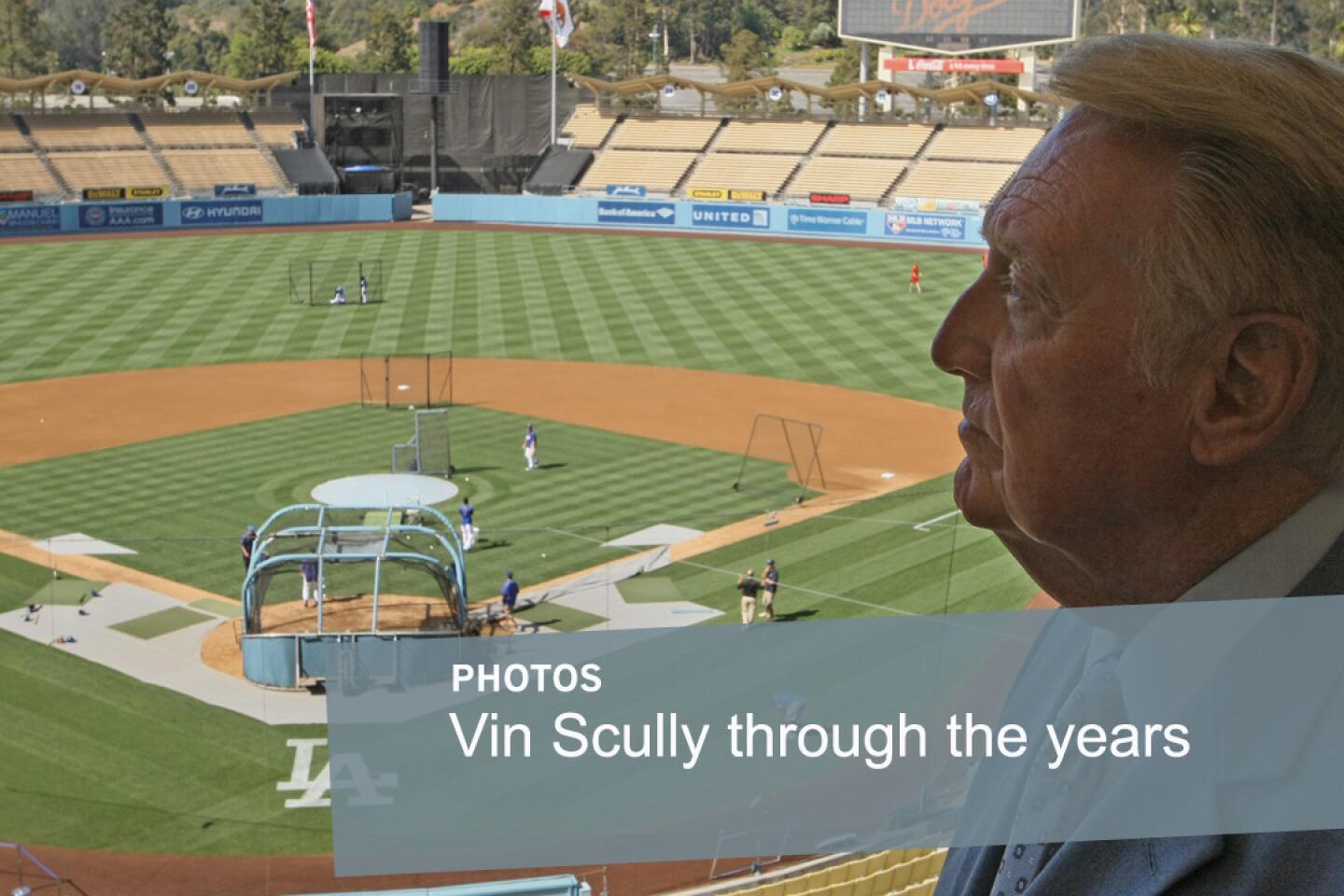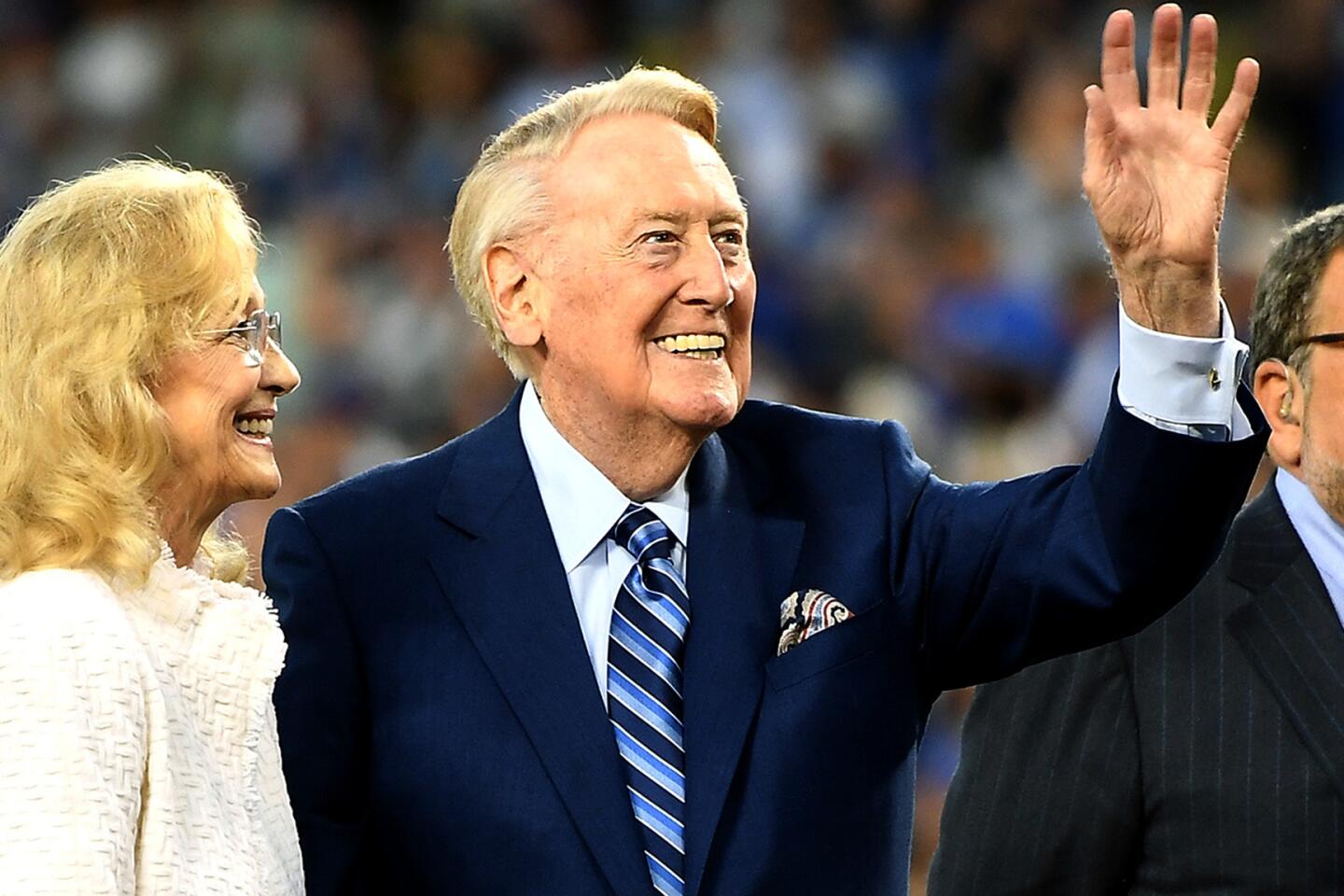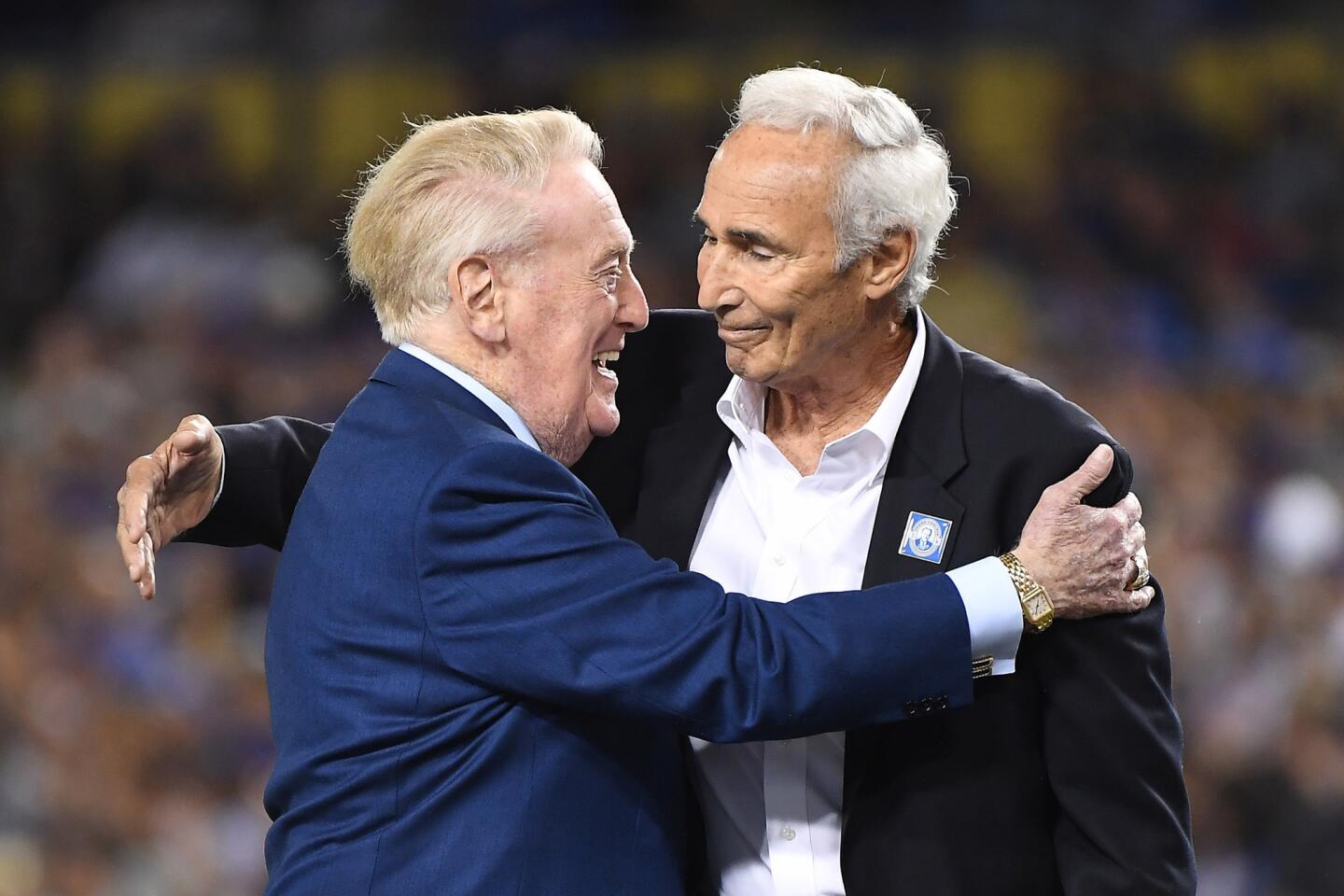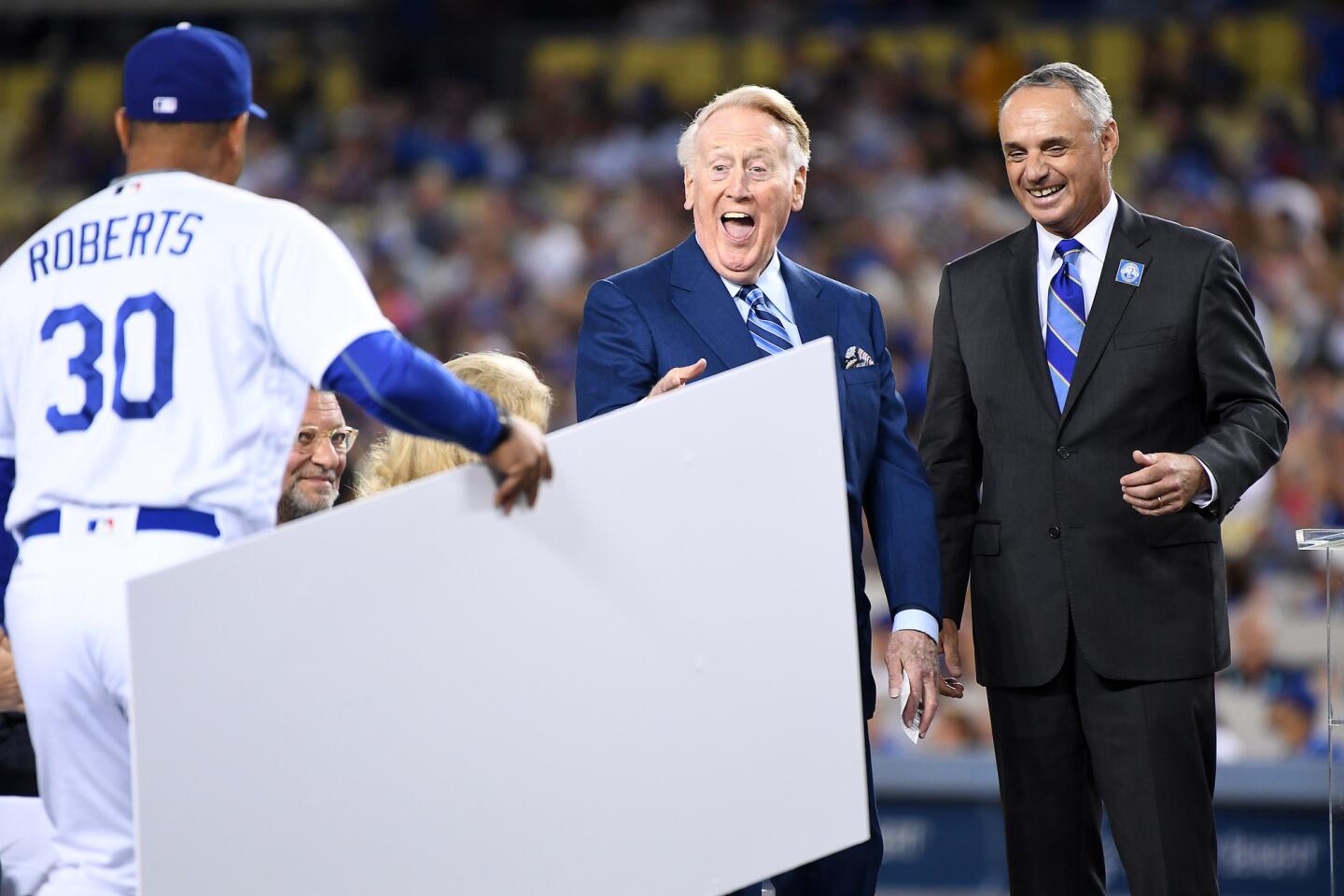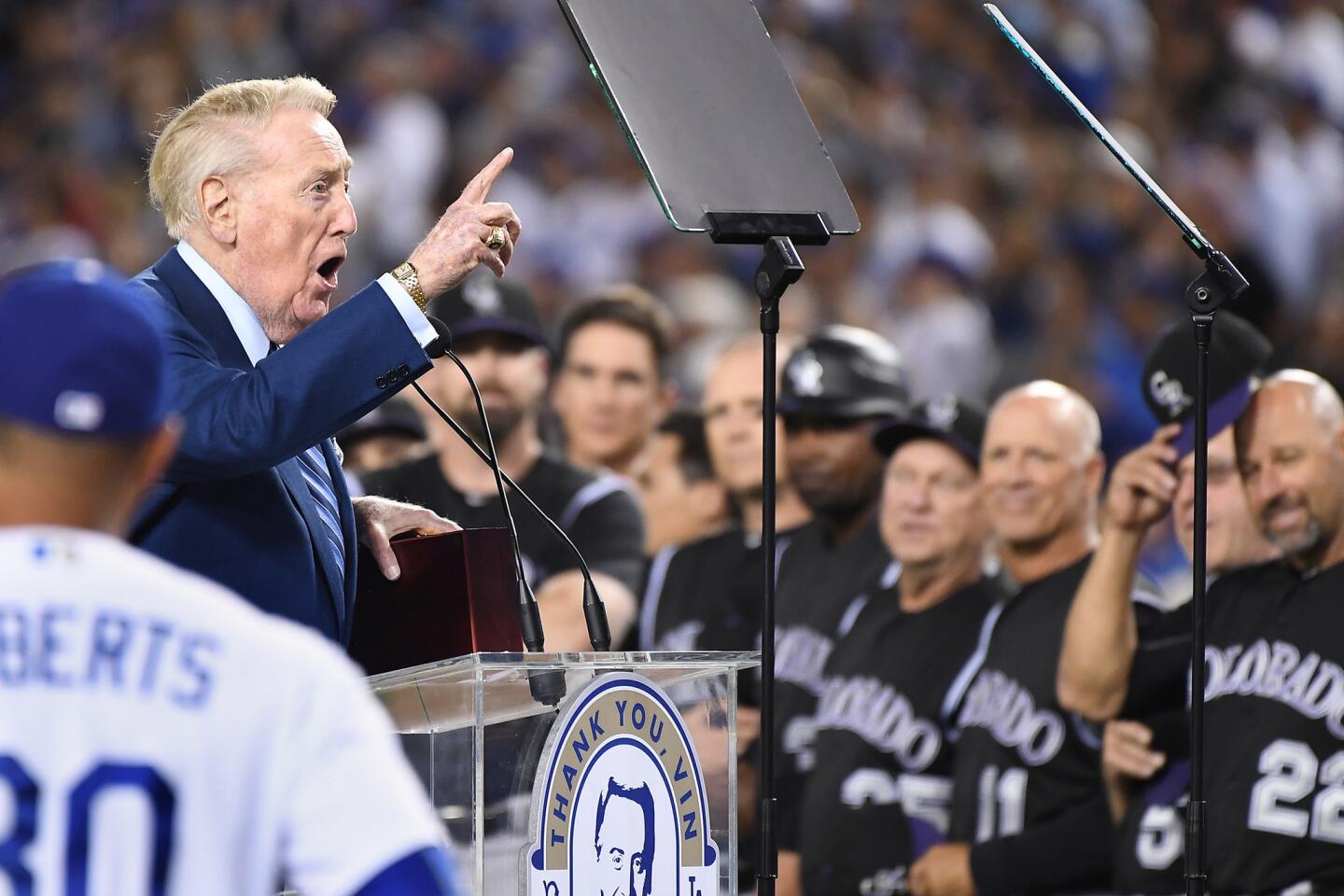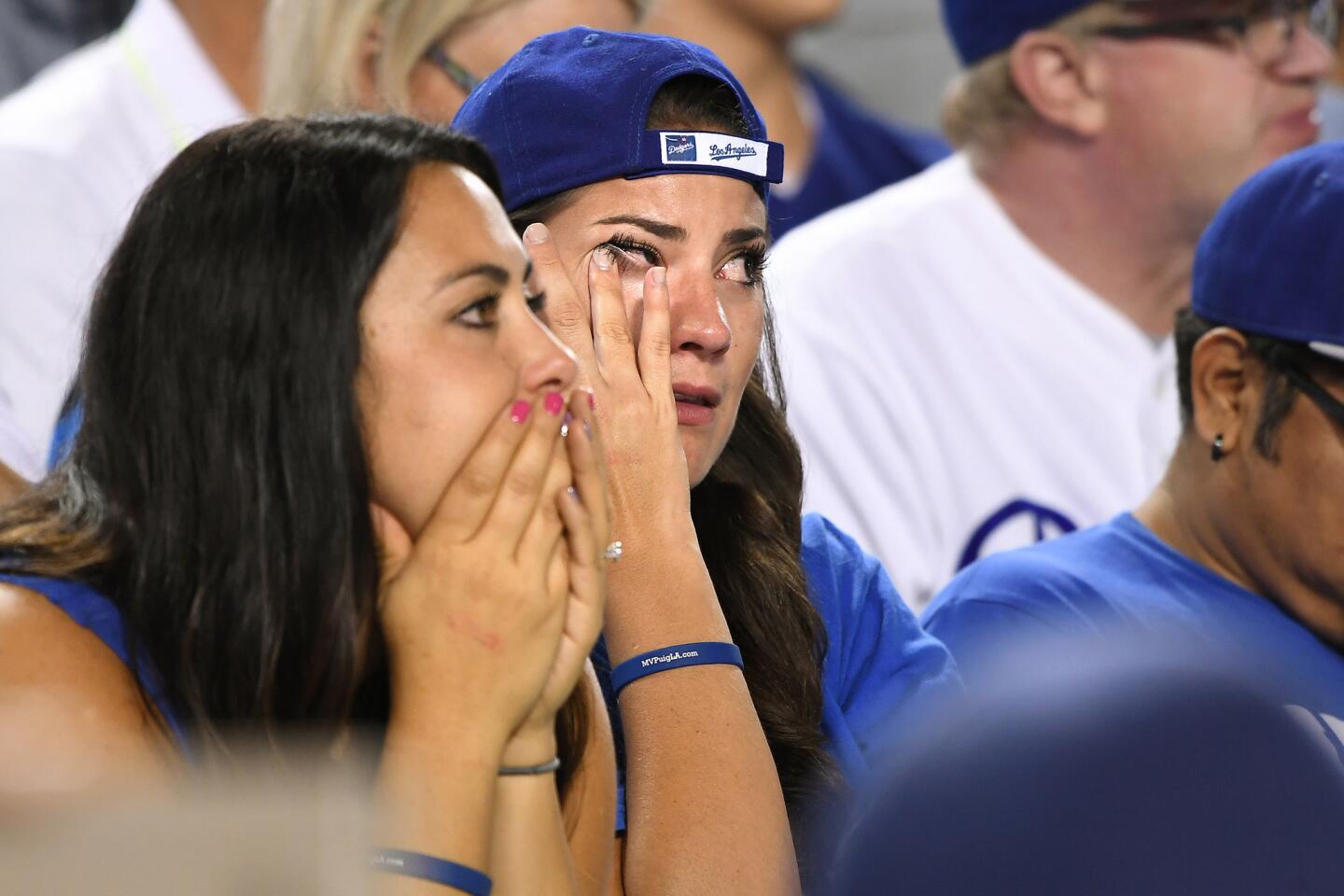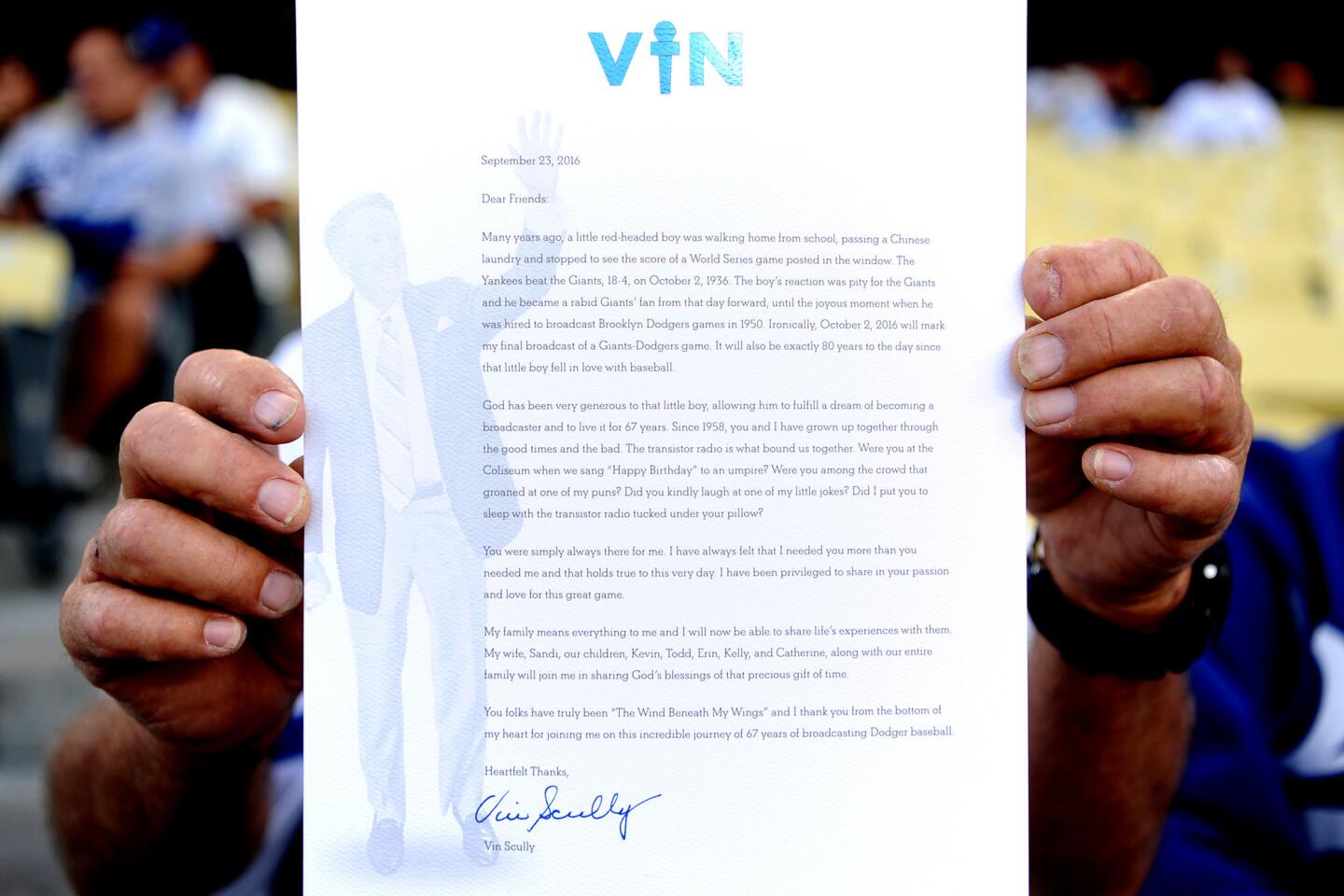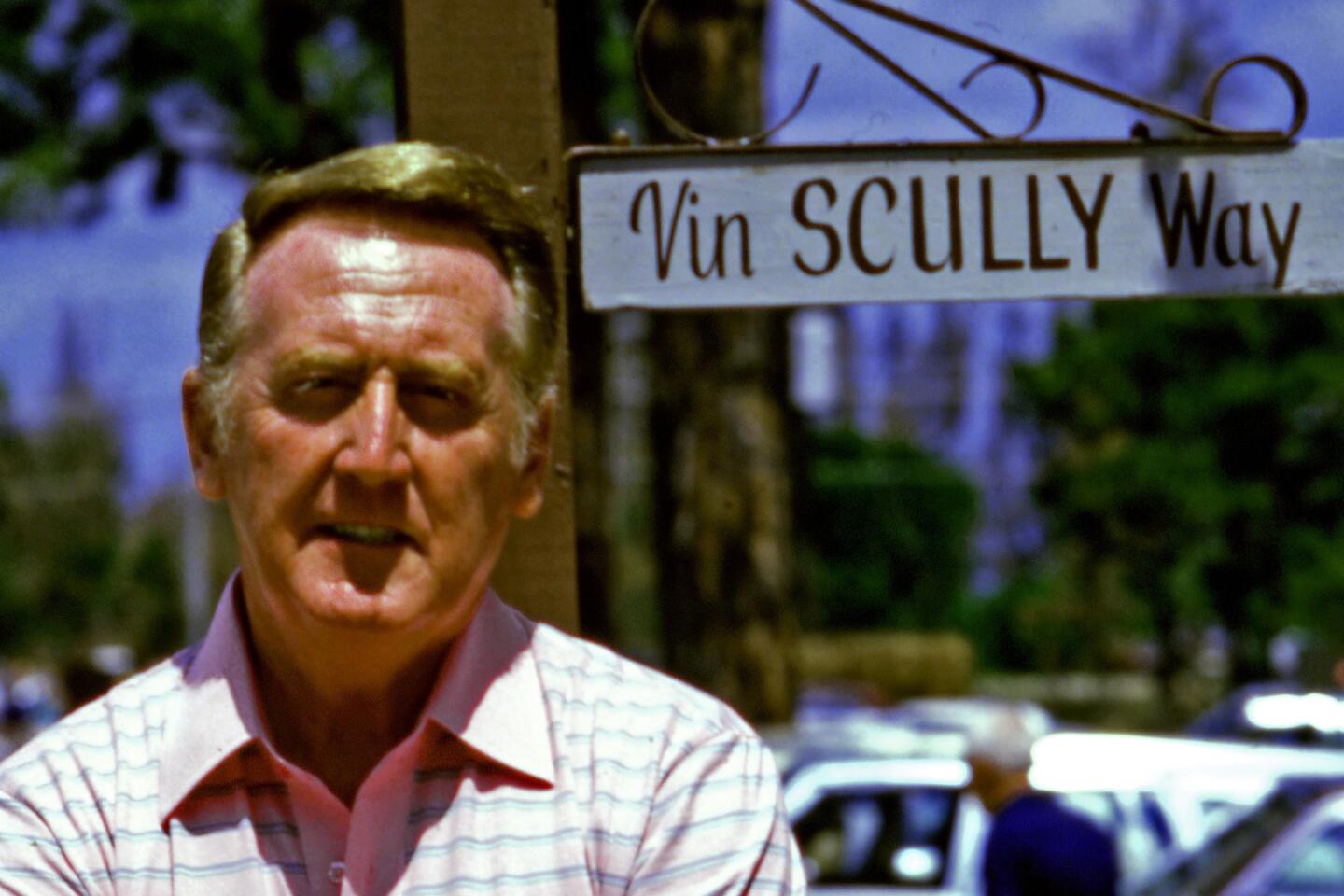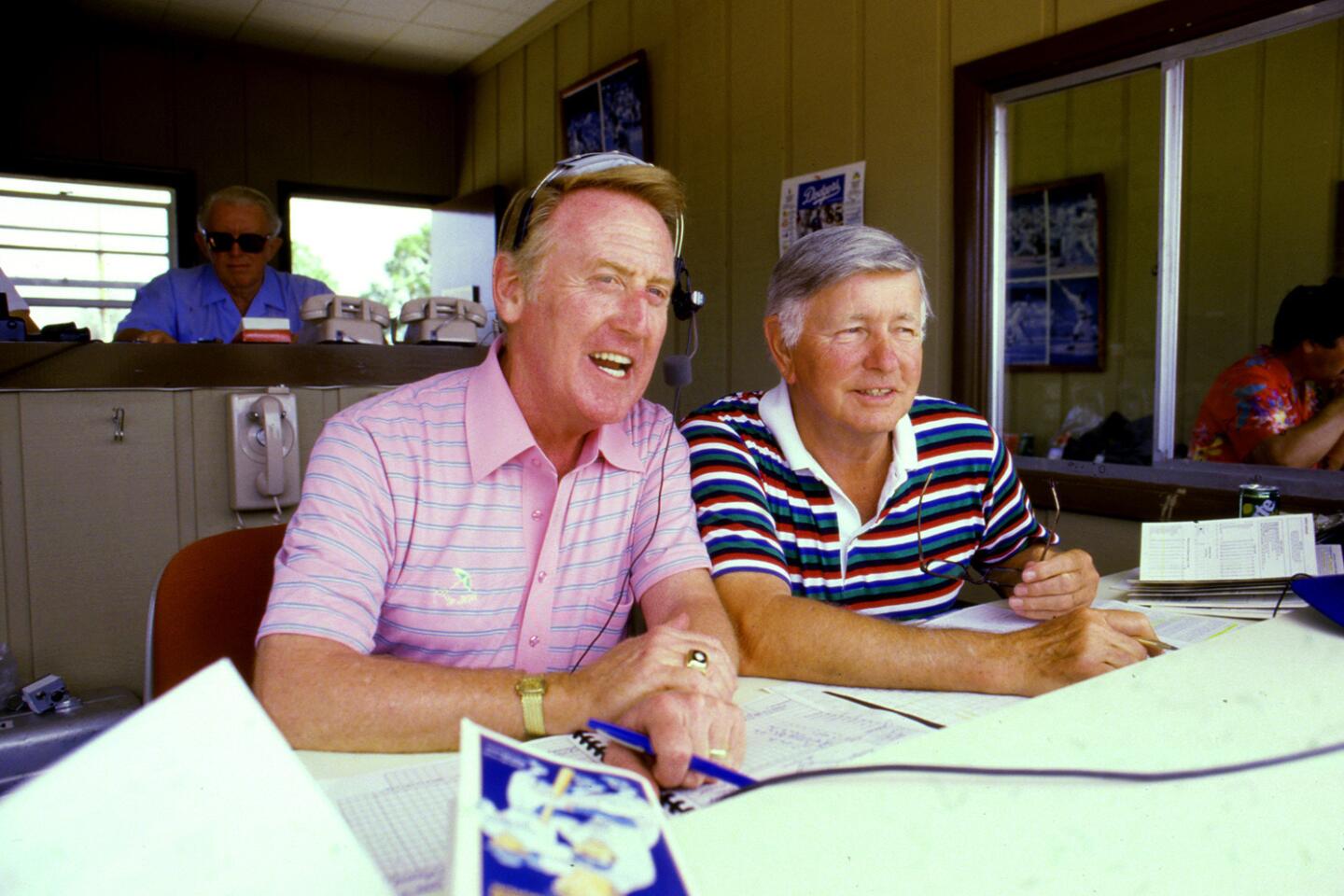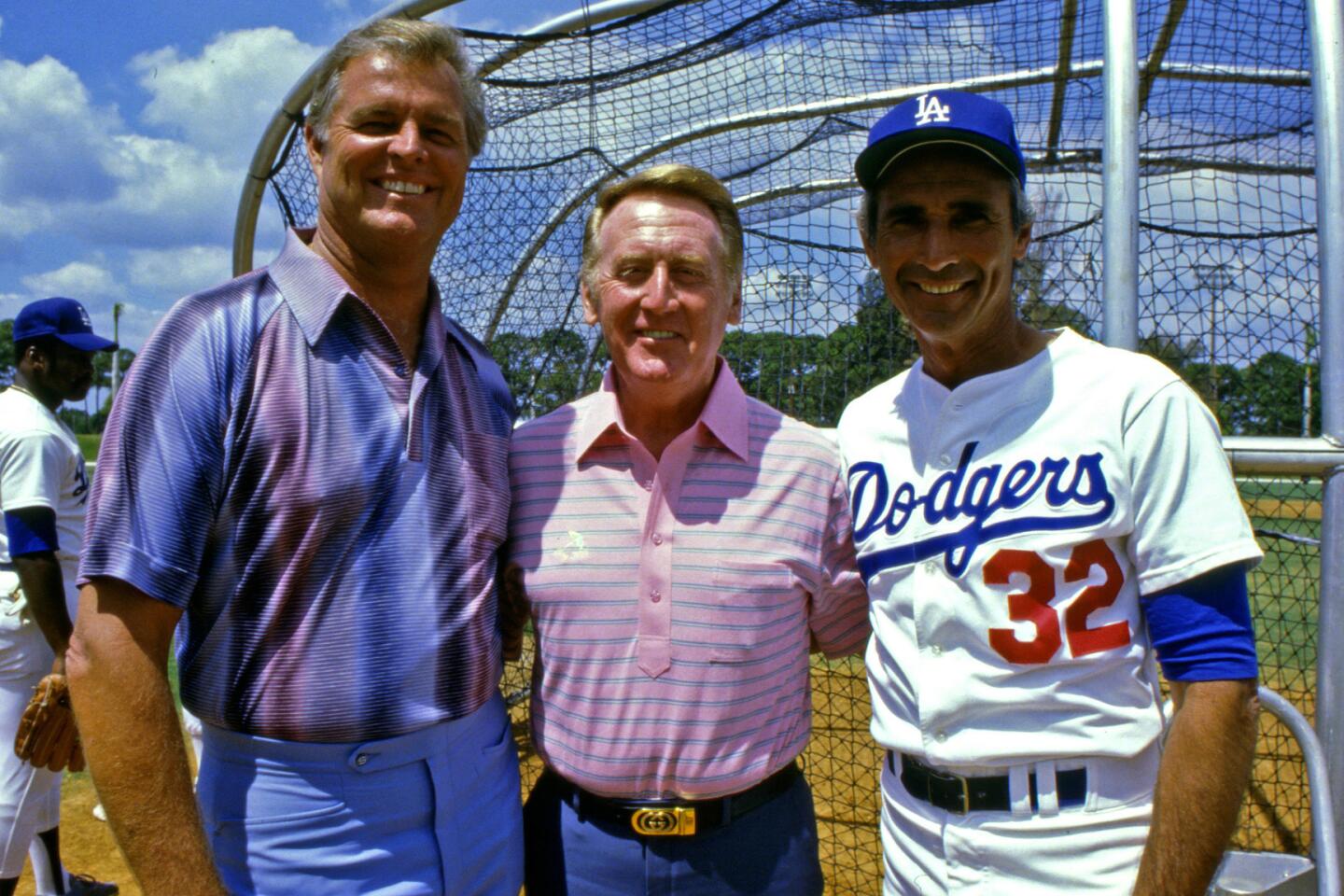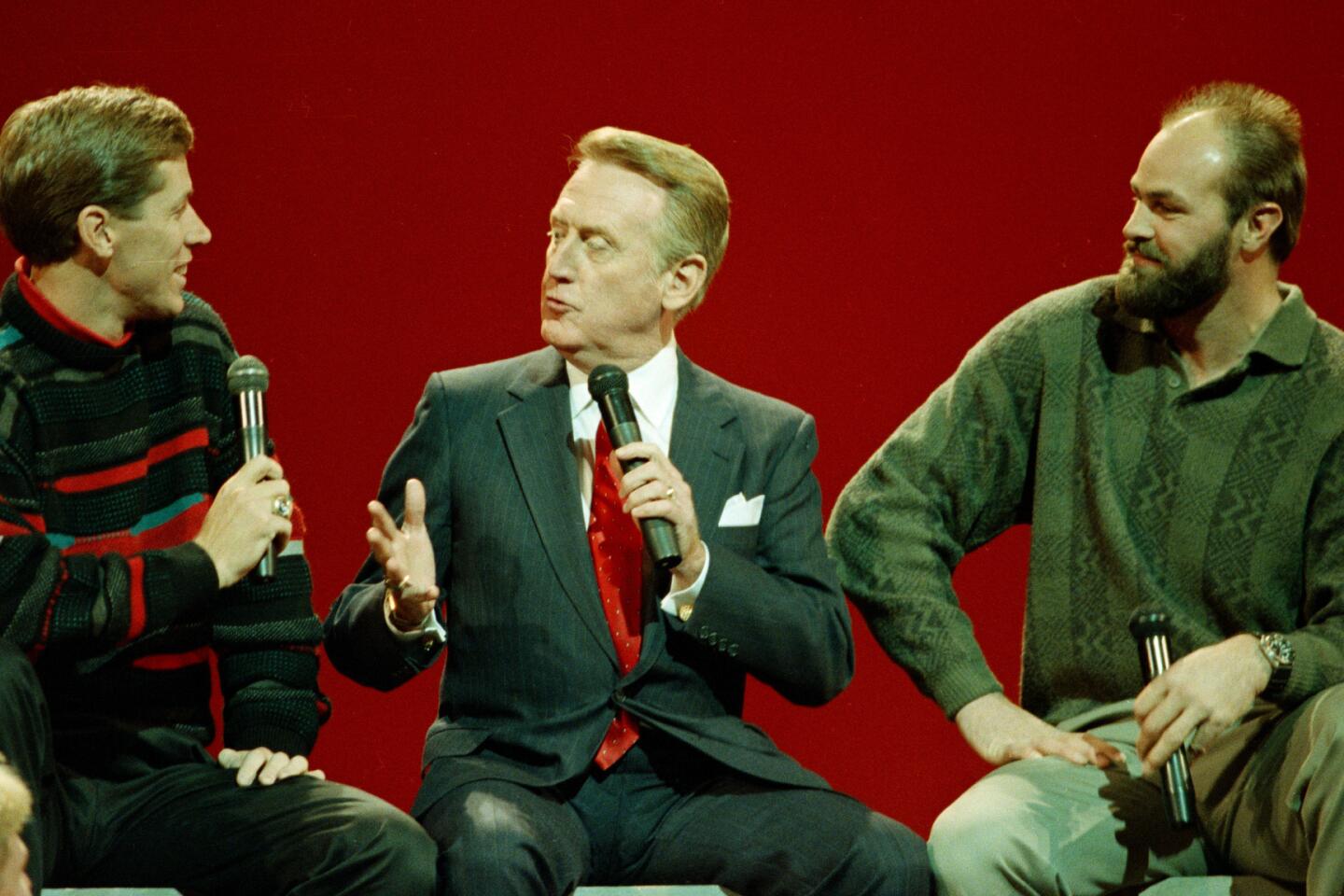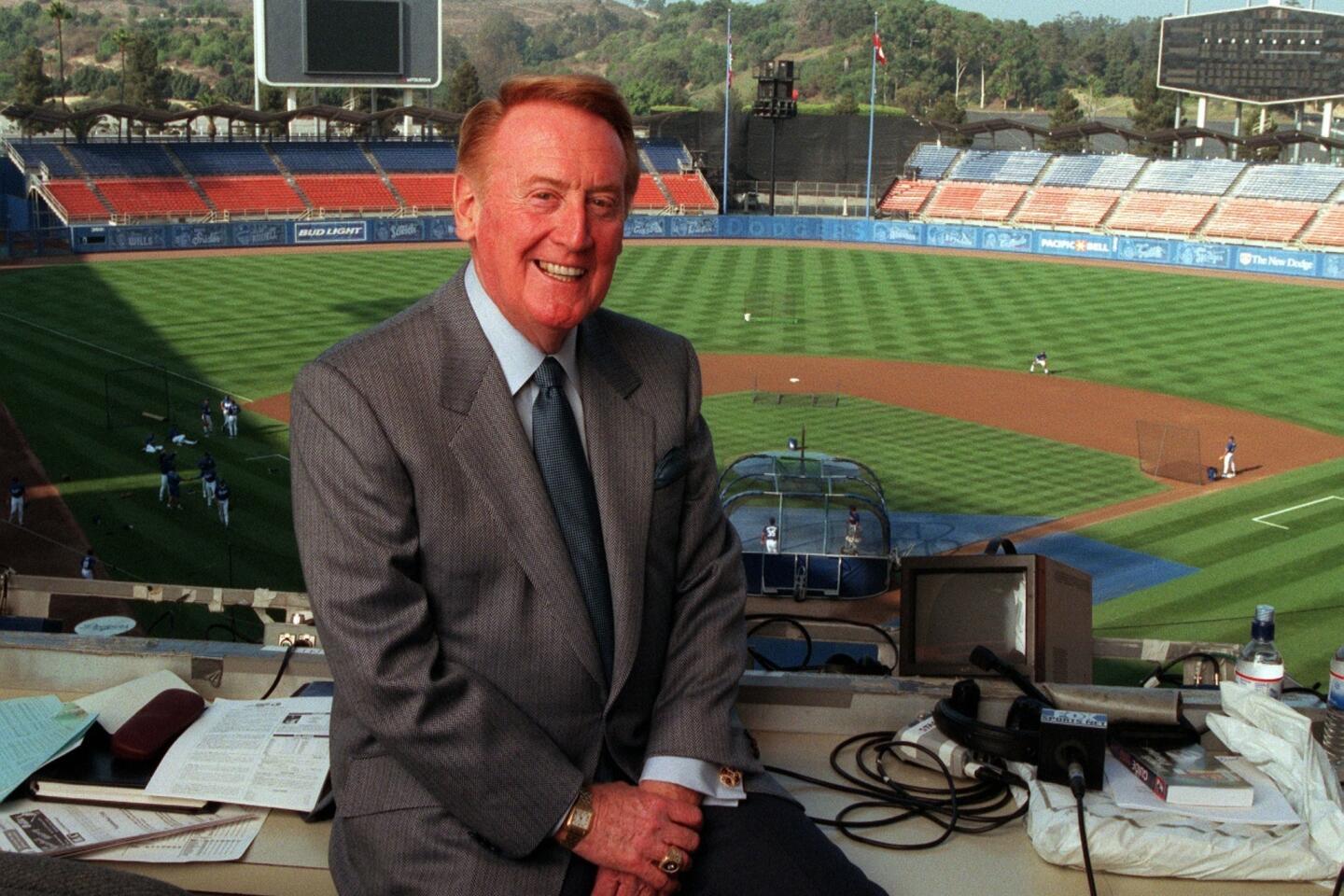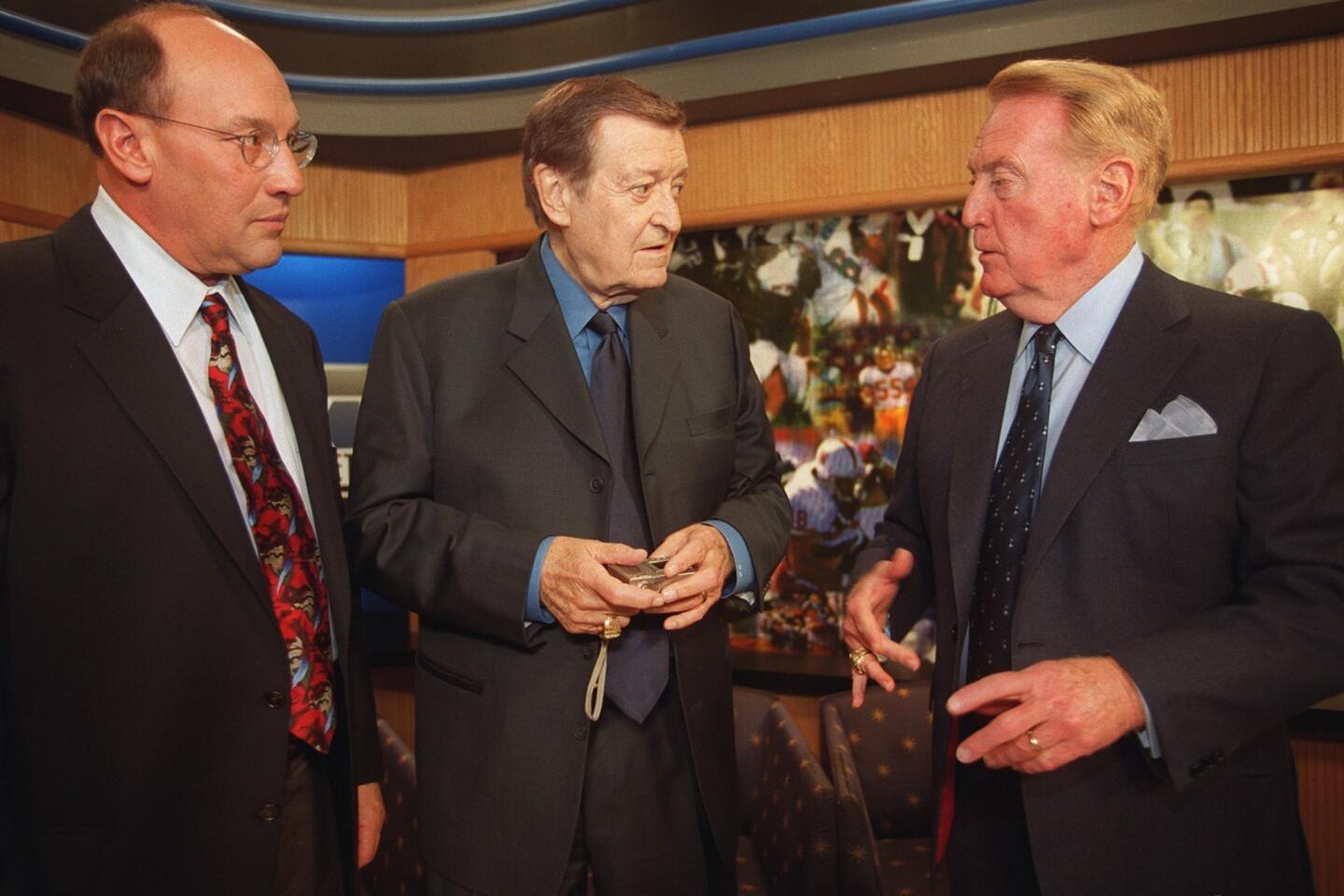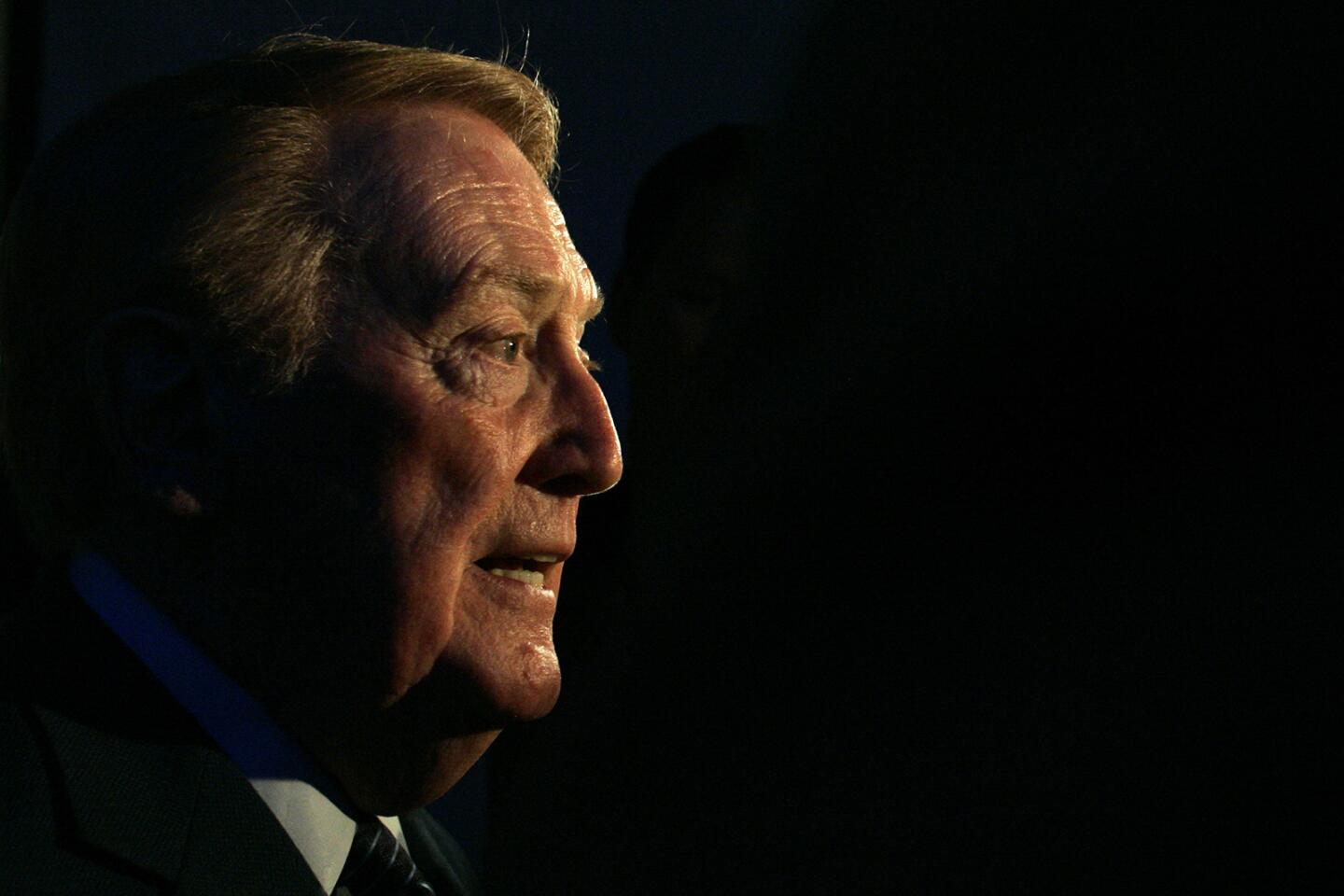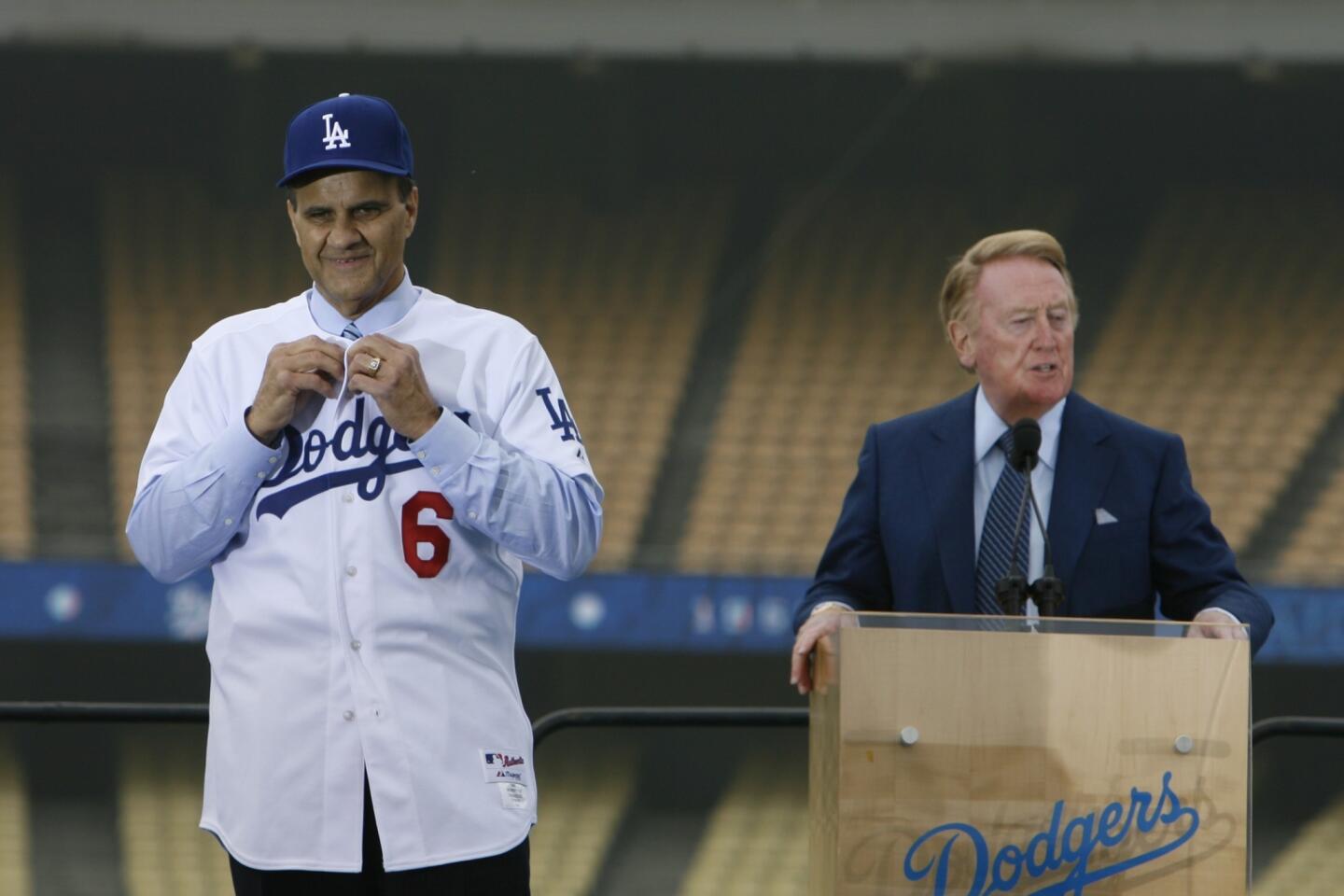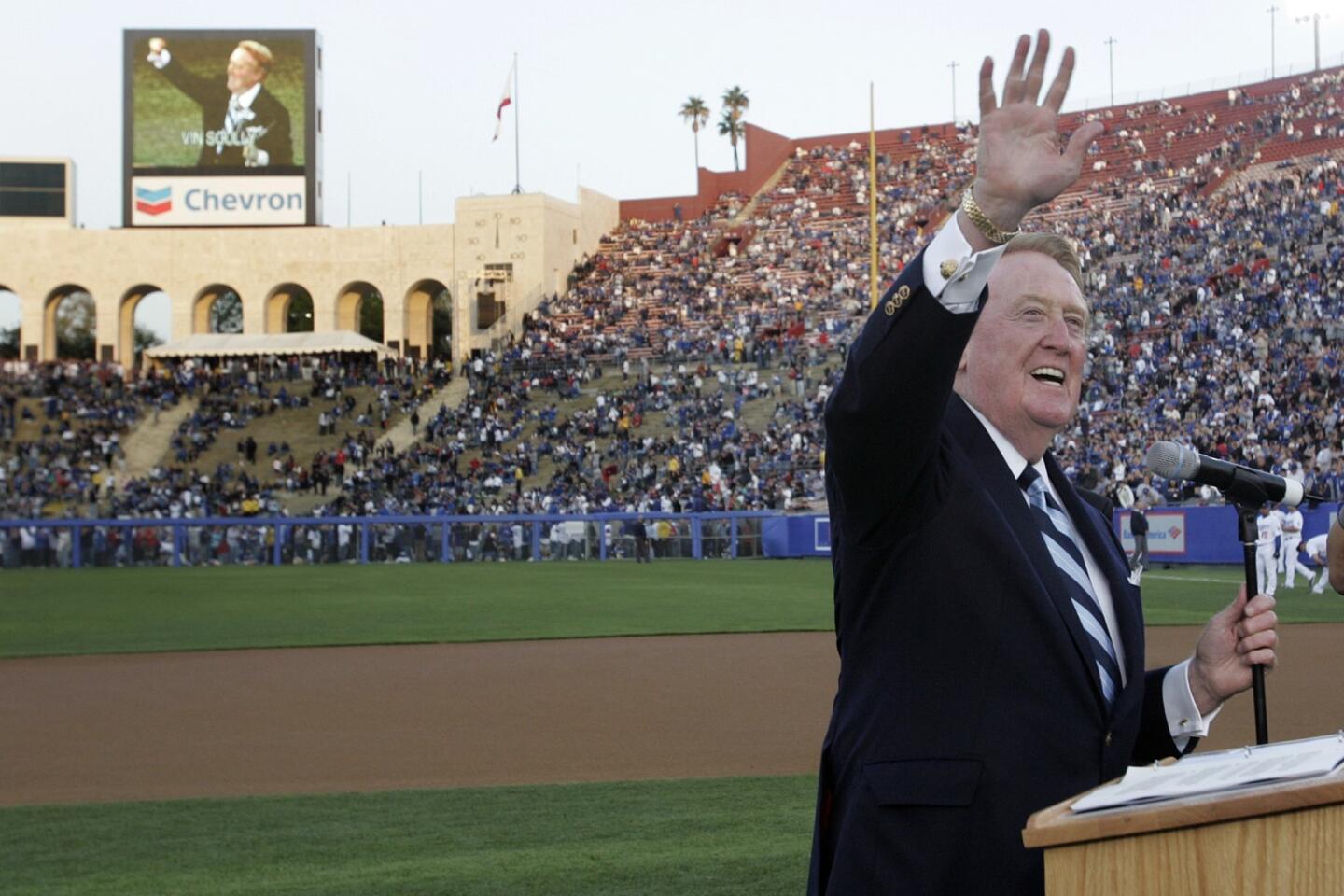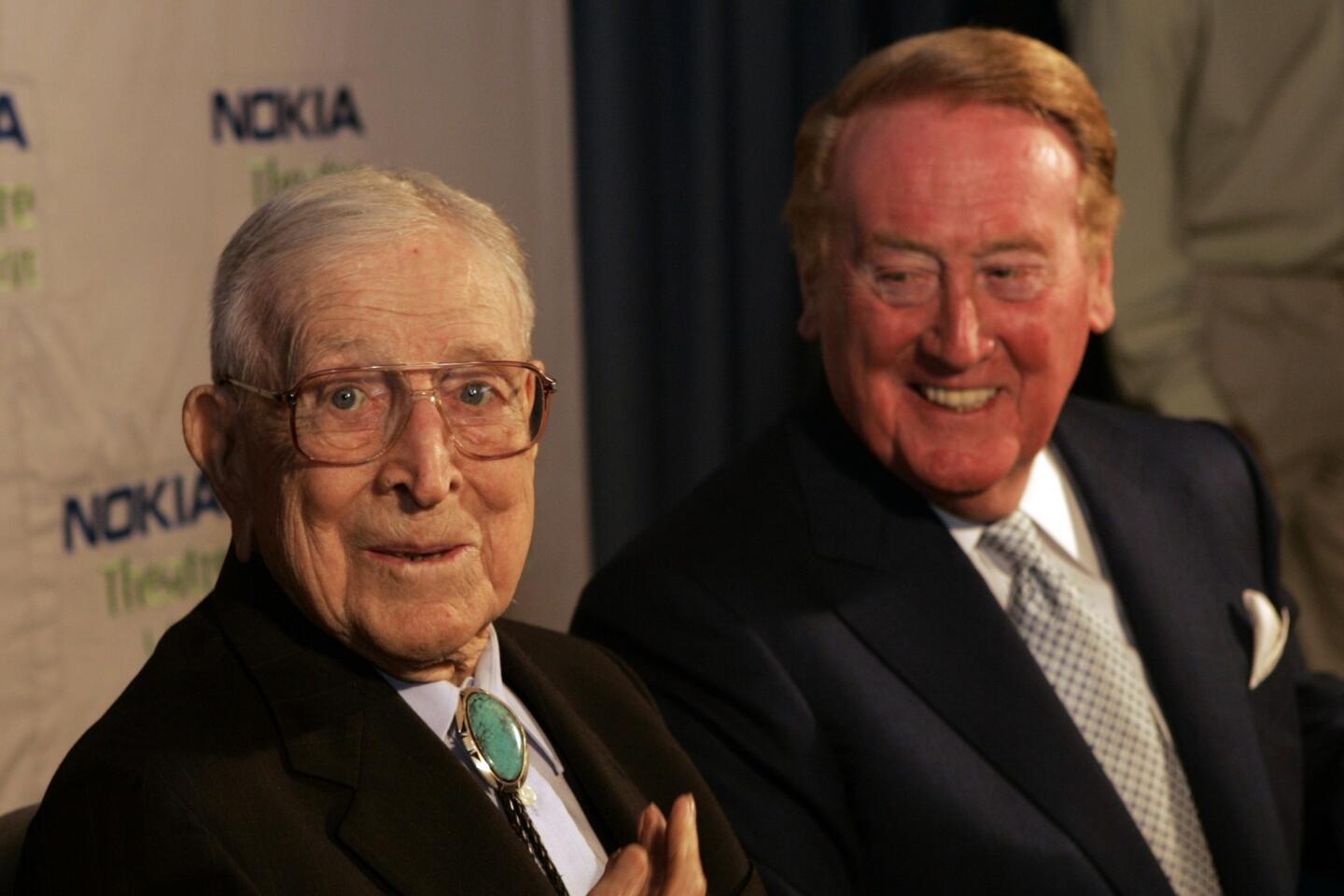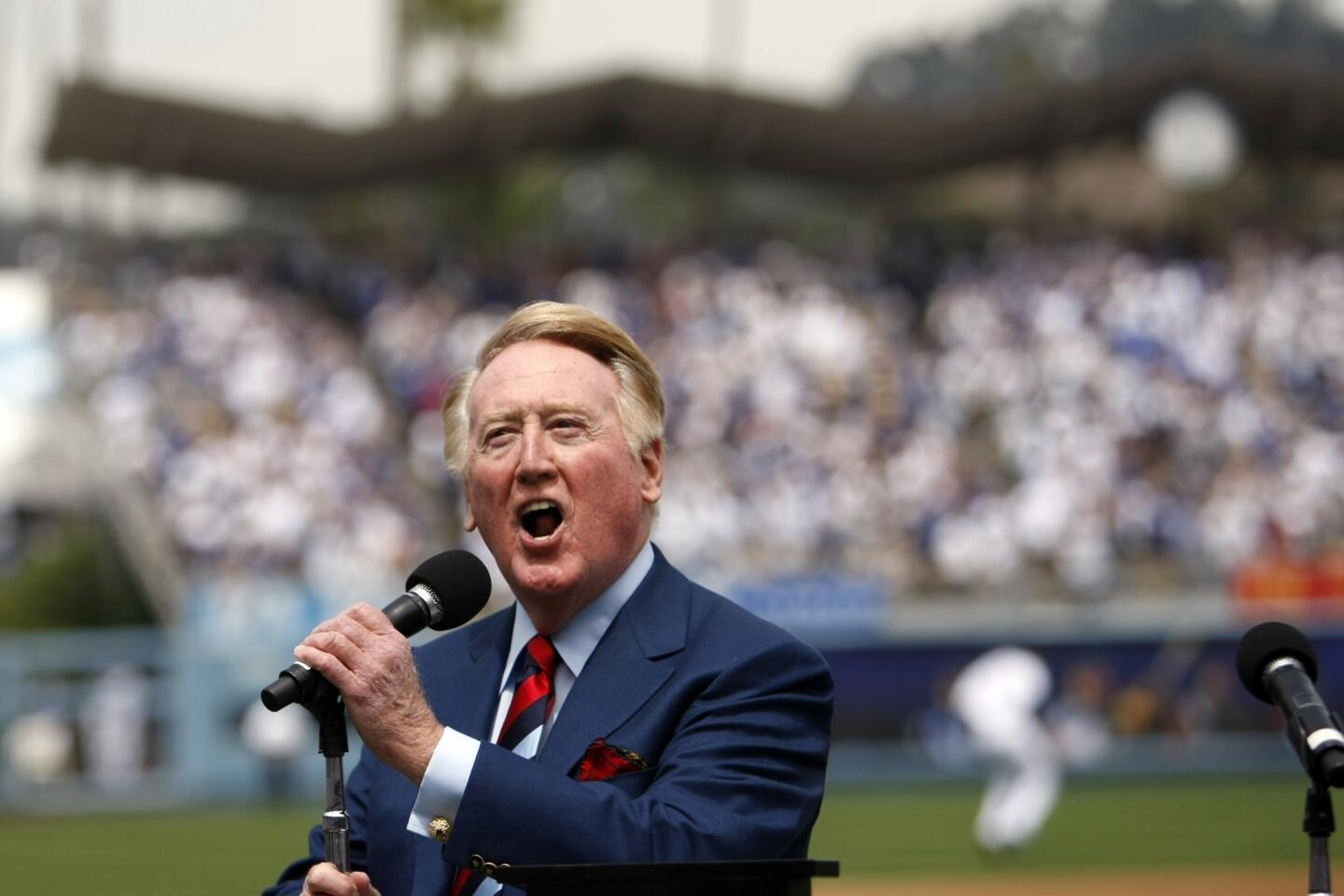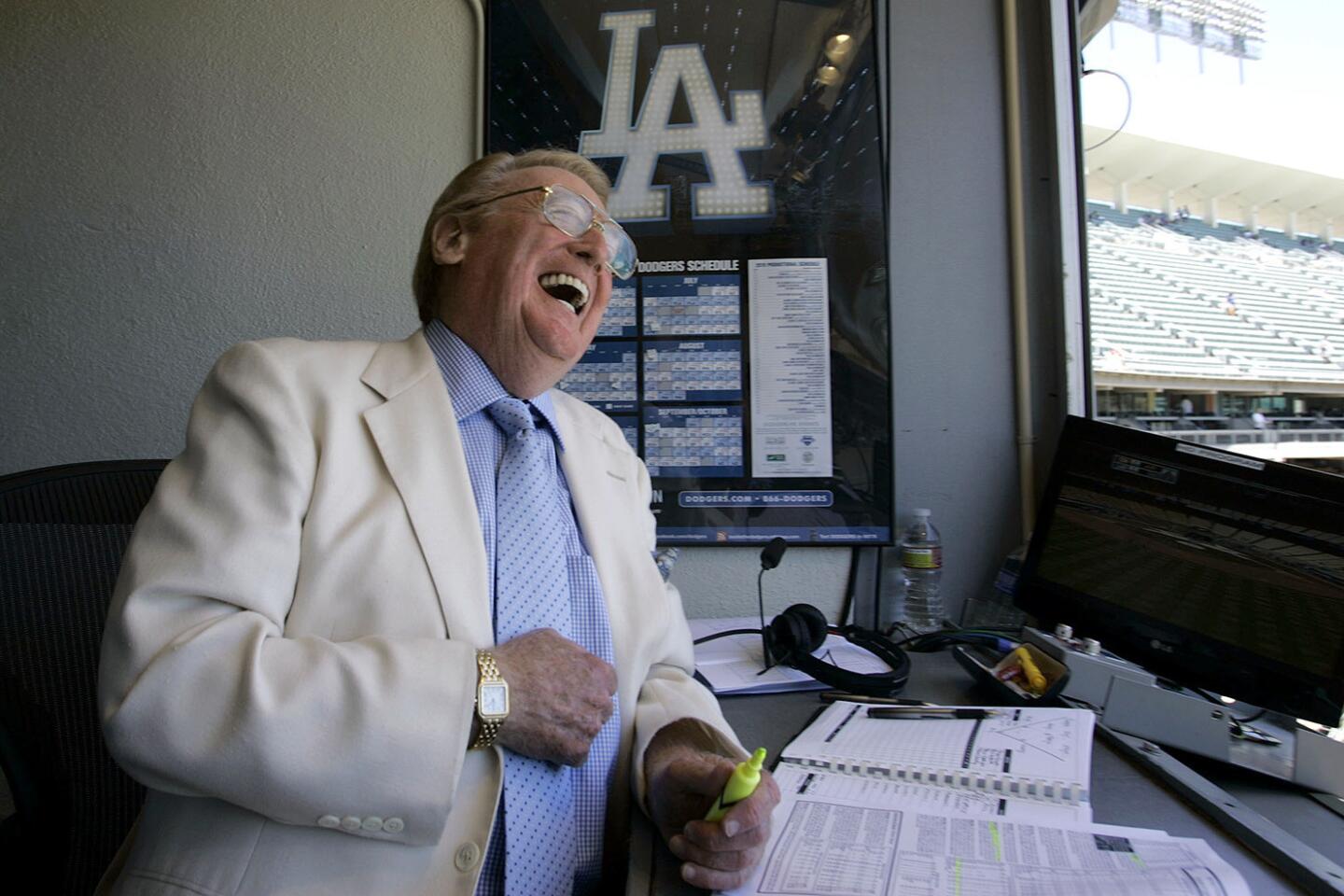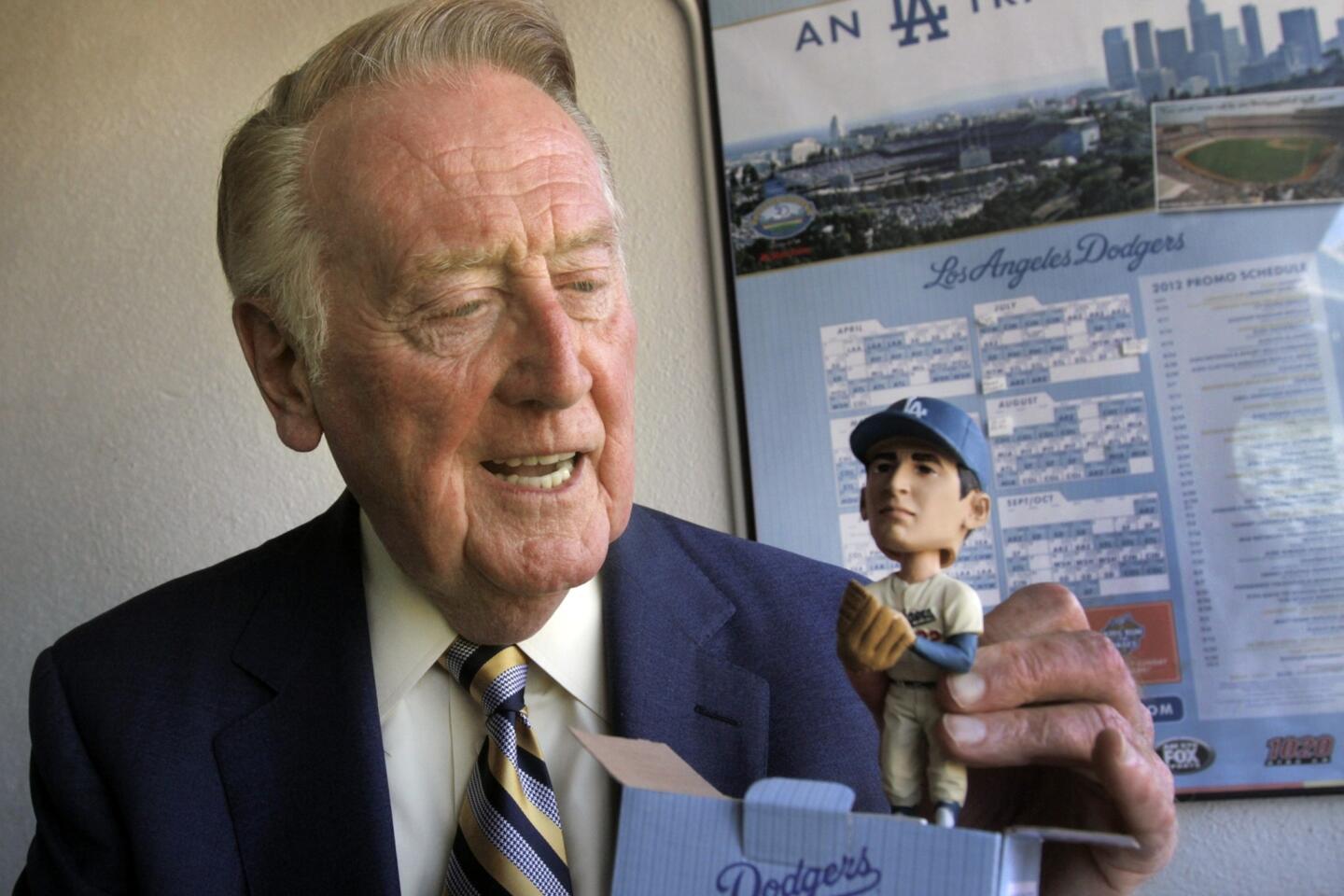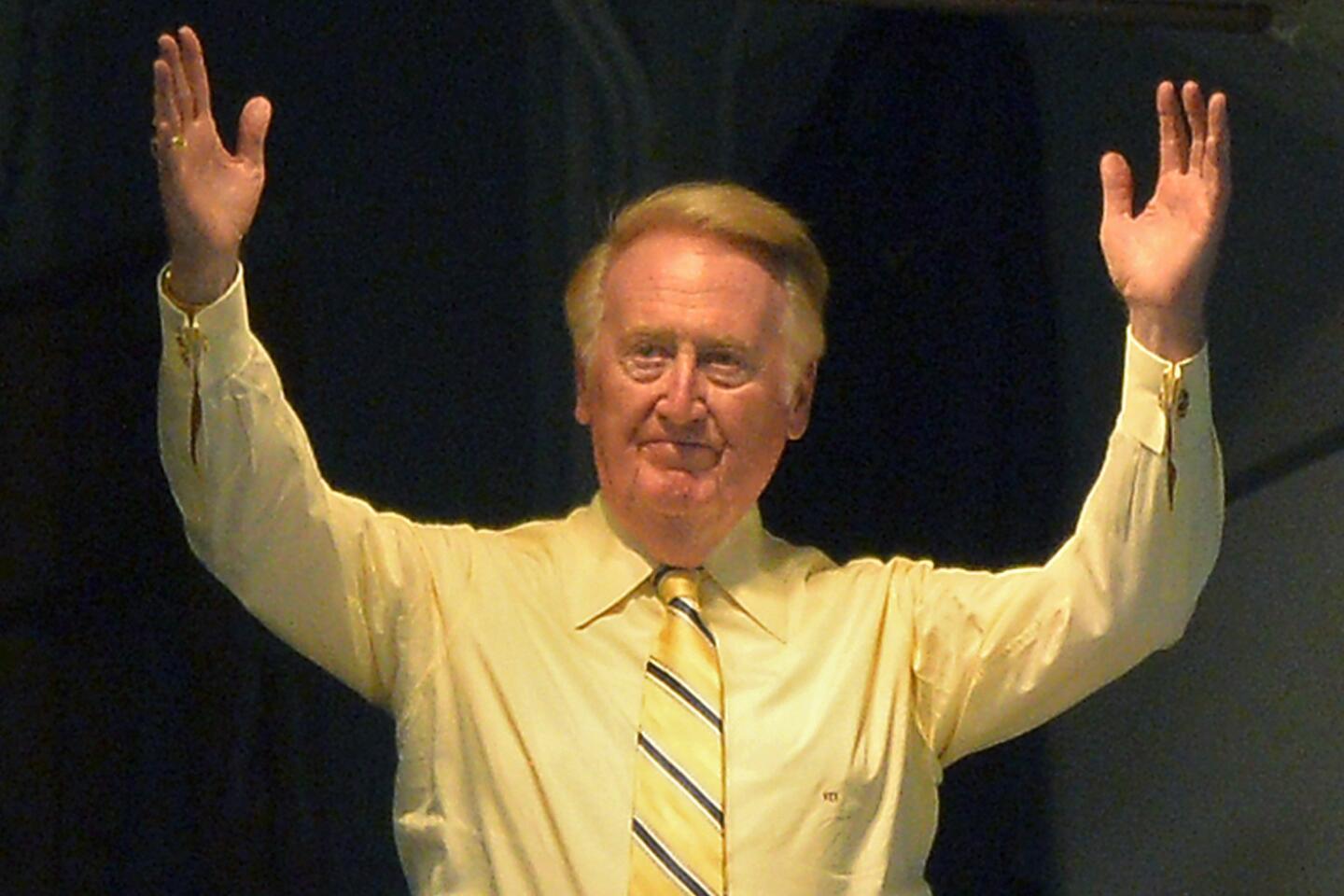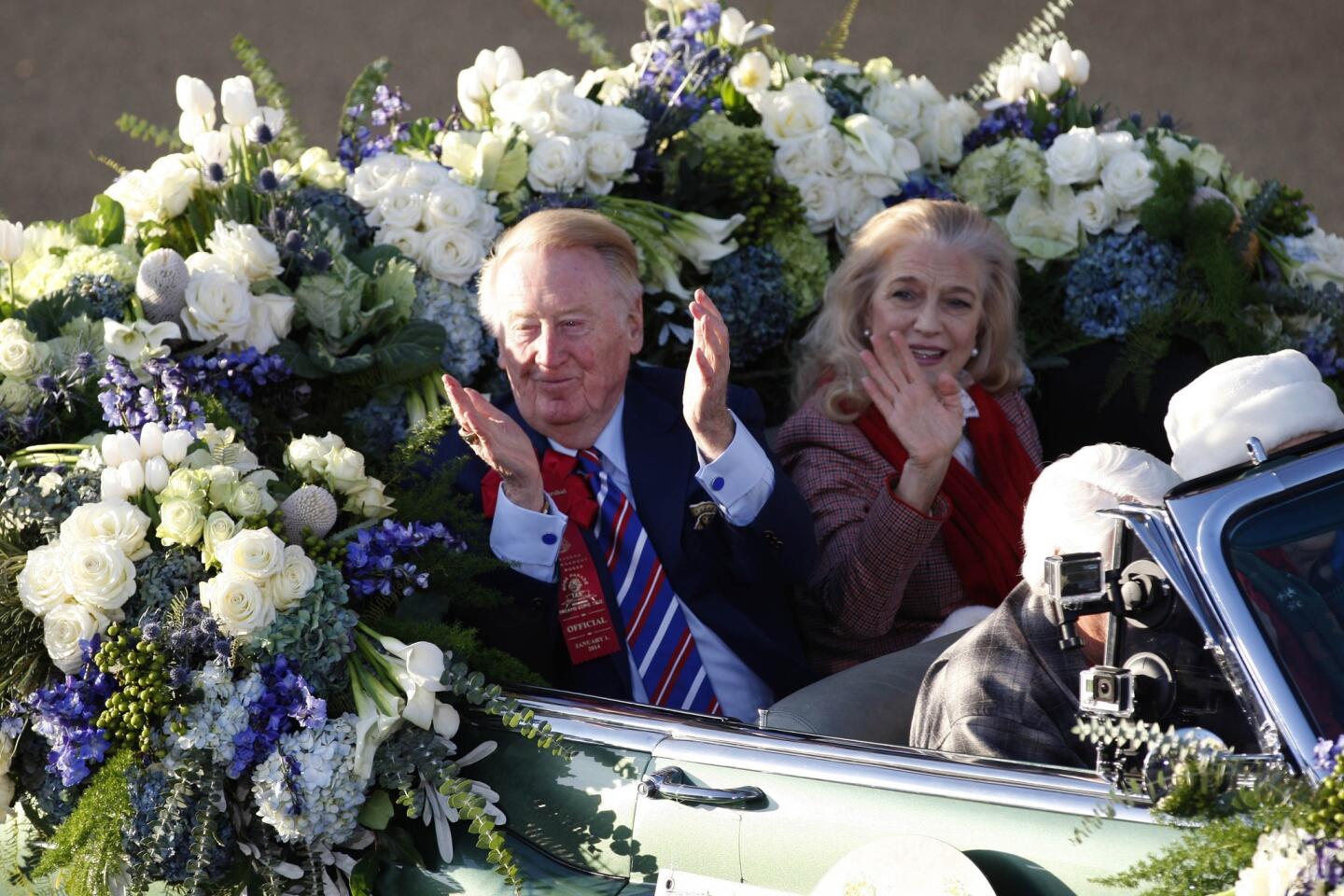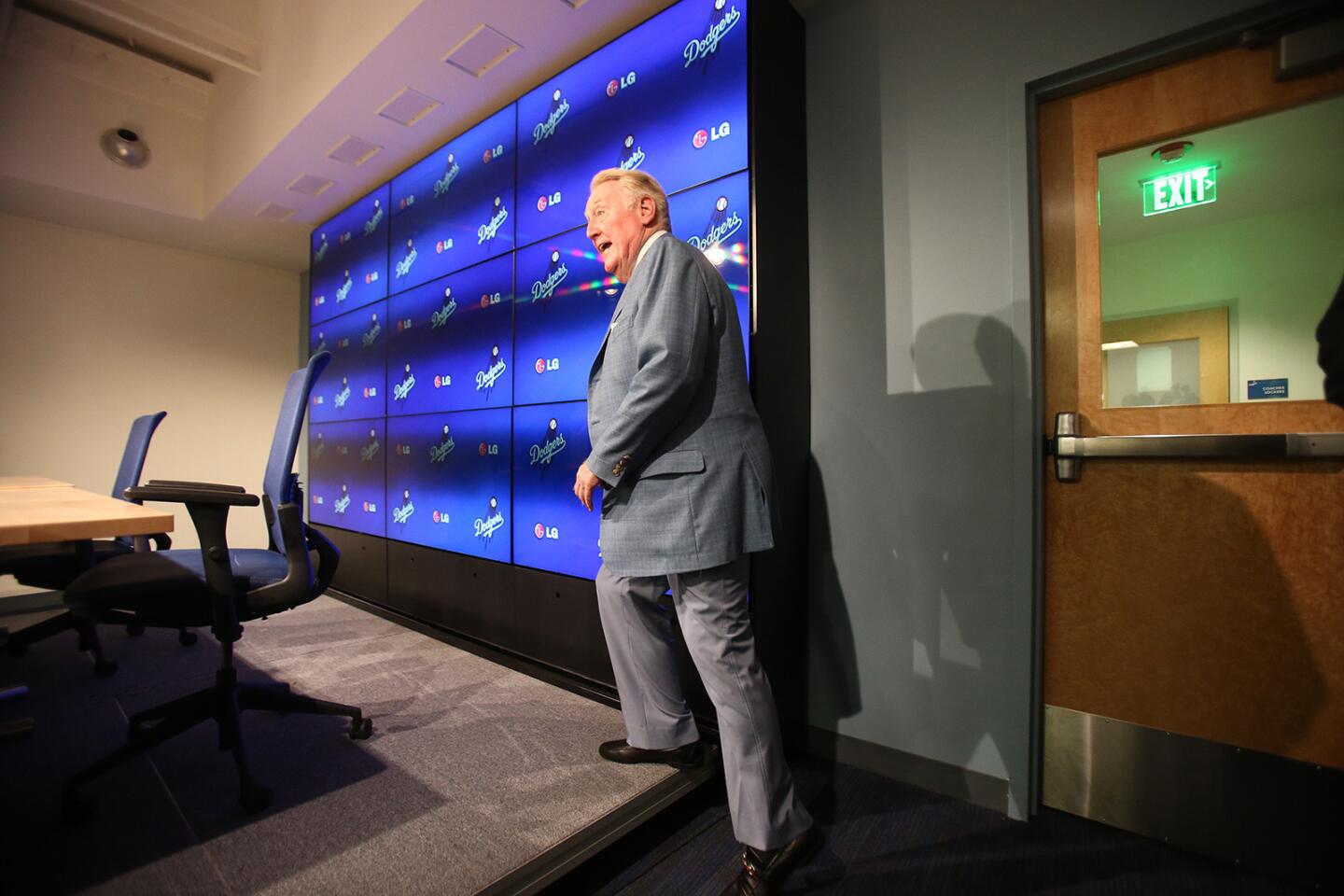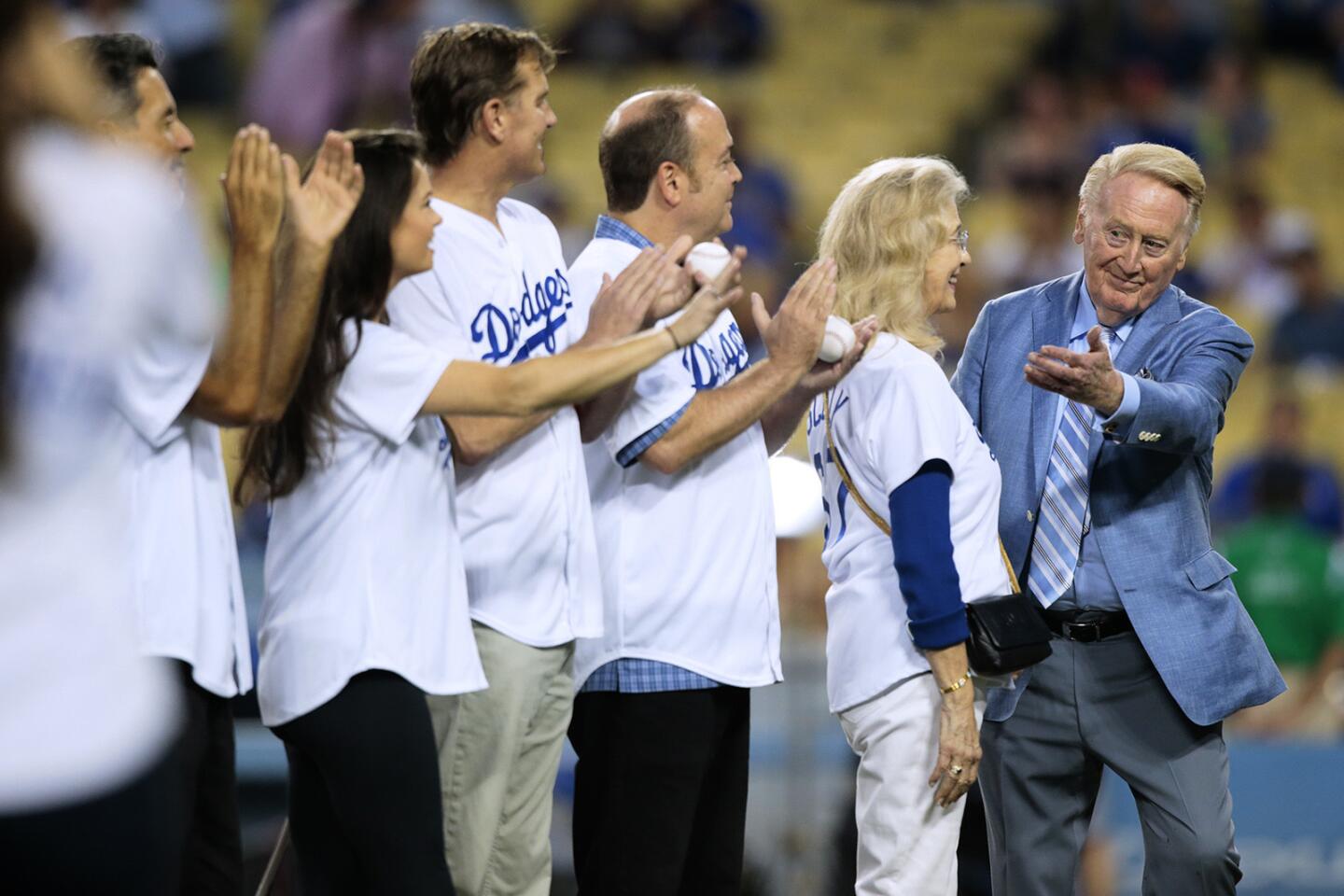Column: Vin Scully is a voice for the ages
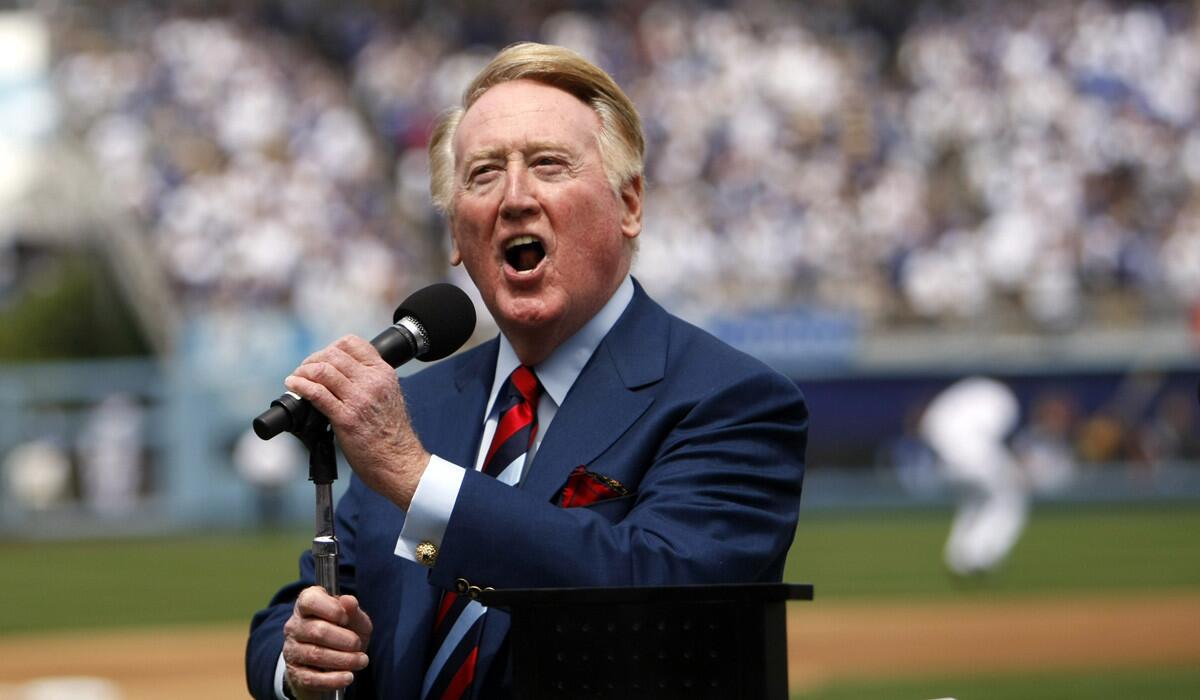
Vin Scully announces, “It’s time for Dodgers baseball,” before the team’s season opener against the San Francisco Giants in April 2009.
The plane lands at Los Angeles International Airport, the shuttle stops at your car, the long trip is over, but everything feels a little strange until you turn on the radio and hear the voice that wraps you in a welcome.
“Hi everybody, and a very pleasant good evening to you, wherever you may be.’’
Now that Vin Scully is leaving, how will we know we are home?
The easy chair creaks, the TV is turned up, the Dodgers are playing, and you are bobbing to the rhythm of a man describing a baseball play as if it’s set to music, whole notes followed by quarter notes, punchy lyrics flowing into a grand finish.
“High drive into left-center field and deep … back goes Pederson … a-way back … it’s gone!’’
Now that Vin Scully is leaving, who will sing to us?
The batter and third baseman each have extraordinary beards. In the middle of an ordinary game, the two are looking at each other and everything slows and you’re about to change the channel when a voice starts telling a story between pitches, a story that will only last as long as the batter stays alive, a wondrous story about those beards.
“One ball and one strike the count … then, of course, you come to Abraham Lincoln, who was clean-shaven, and a little 11-year-old girl named Grace Bedell, she said to Mr. Lincoln: ‘If you would grow a beard, my daddy has a beard and my mother will tease him to vote for you.’ So Abraham Lincoln grew a beard.’’
Now that Vin Scully is leaving, we’ll never again cheer so hard for foul balls.
Scully, who is retiring after 67 years as the radio and television voice of the Dodgers, is the greatest announcer in the history of broadcasting. But he doesn’t belong to the Dodgers or to broadcasting.
What makes this farewell so poignant is that Scully, 88, is that rare Los Angeles sports monument who actually belongs to us.
The players don’t hear him on the field, the big shots rarely hear him from their box seats, and the rest the country only hears him through their wireless. Since the Dodgers arrived here 58 years ago, Scully has spoken almost strictly to us, Angelenos in our cars and in our homes, millions who grew up with his voice in their kitchens and have grown old with it at their bedsides. He is the teacher of our children, the bleacher buddy of our teens, the wise neighbor on our cul-de-sac, and the dear companion of our aging and infirm.
For the people of Los Angeles, he is not merely the announcer of baseball games, he is the soundtrack of our lives, the dignified and graceful accompaniment of endless sandy summers, a daily harmonic reminder of the Southern California dream.
“It’s tiiiime for Dodger baseball!’’
Now that Vin Scully is leaving, will that ever feel so true again?
Scully’s humility is as deep as it is real. His work is for us, not him.
It is our last interview before he retires. It takes place in the middle of a week when the Dodgers are on the road, when Scully can relax at his San Fernando Valley home without being swarmed by the multitudes of fans who crowd outside the press box each night in this final season, hoping for a glimpse of his red hair and ruddy smile, straining to hear a smattering of his farewell words.
Scully and I have spoken for 30 years in dugouts and press box dining rooms and golf course restaurants, and there is seemingly little he can say that I haven’t heard, but I just want to be around him a little while longer. I can’t help it.
For this final chat, I ask for 15 minutes. He gives me nearly an hour.
“I don’t have any doubts, I know this is the time to retire,’’ he says. “I’m going to be 89 in November and I thought, ‘Gee whiz, how can I be doing the games next year, looking forward to my 90th birthday?’ Something just doesn’t sound right there.’’
We wouldn’t care. We wouldn’t notice. But Scully, who missed last year’s postseason with an illness, is weary of tempting time and fate. He wants to spend as many moments as possible with a family that includes wife Sandi, five children, 16 grandchildren and three great-grandchildren.
“God has been so generous to allow me all this time, when I look back and I think, ‘I’ve had so many yesterdays, but I’m not sure how many tomorrows,’” he says. “I feel it’s best to see if I can enjoy whatever tomorrows are left.’’
He is still so sharp that this week he was describing the pendant on the chain around the neck of San Francisco reliever Will Smith. He’s still so engaged that his description of the shouting match between Yasiel Puig and Madison Bumgarner went viral. He’s not leaving because he’s lost anything. He’s leaving because he knows there are greater joys remaining in his life, and he wants to find them while he still can.
“I’ll miss it, I’ll miss it a great deal,’’ he says. “But they’re precious, whatever tomorrows are left.”
::
Everyone has a favorite Vin Scully story, but they are rarely about baseball. More often, they are about us, how he’s comforted, or enlightened, or entertained, or simply been part of the connective fabric of our lives.
My Scully stories began when I was a young reporter covering the Dodgers for this newspaper in the late 1980s. I would sneak a radio to my place in the Dodger Stadium press box and stick headphones into my ears and listen to him broadcast the final three innings. I was typing so furiously under deadline pressure I couldn’t really watch the games, so Scully watched them for me, and taught me baseball in the process.
Another of my Scully stories involves the time I met him a restaurant for a magazine interview. I pulled up to the valet parking space and pulled out my wallet when the valet stopped me.
“Mr. Scully has already paid,’’ the man said.
I met him at the table and enjoyed a long lunch filled with typical Scully tales of love and laughter, and then waited for a bill which I could put on my expense account.
Only when Scully had excused himself did a waiter come up and put his hand on my shoulder.
“Mr. Scully has already paid,’’ he said.
Scully later told me the lunch was his ‘’honor,’’ which says a lot more about Scully than it does about me.
While I was reporting that same article, Scully asked me not to call his children because he didn’t want them to be bothered, and I obliged. I was in the middle of writing the piece when my phone rang. It was his daughter Catherine.
“I don’t care what my father said, I cannot let you write a story without telling you how great he is,’’ she said.
Catherine told of her dad standing in the shallow end of the family swimming pool every afternoon as he made his first sports call of the day, announcing her jumping into the pool.
“Ladies and gentleman, now presenting the infamous Catherine Anne Whale!’’ he would intone as she leaped giggling into his arms.
I wrote down the story, thanked Catherine, hung up, and the phone rang again. It was another one of his children with another story. Then another one called. And another one called.
There was the story of Vin giving wife Sandi a cassette tape for Christmas. It wasn’t from one of his Broadway heroes. It was of him singing “Wind Beneath My Wings.” Sandi wept when she received it, and it remains a prized possession.
There was the story of how Scully, who used to smoke, taking a pack of cigarettes out of his shirt pocket and replacing it with a family photo, which he would touch and examine and cherish for eight months, until he finally kicked the habit.
“He is not some myth,’’ Catherine told me that day. “He is real.’’
::
It was Vin Scully Bobblehead Night at Dodger Stadium earlier this week, with a rare midweek sellout crowd of 53,621 crowding Chavez Ravine for a chance to acquire the collectible.
Yet when Scully announced the unusual attendance, he never mentioned the bobblehead.
“Even a little rhubarb like last night involving Bumgarner and Puig, I’m sure that brought a lot of people here, absolutely,’’ he said.
No, not even close. The fans were there for Scully, who is the most important Dodger in Los Angeles history and second only behind Jackie Robinson in Dodgers history. But Scully’s humility is as deep as it is real. His work is for us, not him. When he makes a memorable call, he fnever purposely listens to it again.
“I’m not much for looking back, I treasure the experiences and don’t look at them again,’’ he says. “I have it all on DVDs, and they’re filed away, and when I go in a puff of smoke, the grandkids have record of granddad doing this and that.’’
When he is needed to announce a special pregame event, the Dodgers must coax him down to the field. Once there, instead of waving to the crowd, he claps for the crowd. In a hey-look-at-me era, Scully is always only looking out for us.
“I’m just another grain of sand on the beach,’’ he says. “Years ago I said to people, ‘I need you more than you need me,’ and I meant that from the bottom of my heart.’’
Scully will never admit that he has fans. In that context,he doesn’t even use the word.
“I don’t use the word ‘fans’ ever, because it’s short for fanatic,’’ he says. “I always use ‘friends’ because I think of them as friends, and people seem to think of me as friend, for that I’m humbled by the thousands.’’
He’s so humble that, because he refused to stand under much of a spotlight in this final season, his farewell tour came to him. It has long been a tradition that umpires, before the first game of every series at Dodger Stadium, look up at the booth and uniformly salute Scully. But this season, both players and umpires, sometimes in uniform, have taken elevator rides to the fifth floor to visit his booth to simply say thank you.
Most of them were Southland-born kids who listened to Scully while growing up. But some of them had never even heard Scully call a single pitch.
“The Dodgers are extremely popular, whoever would have sat in my chair and had been blessed to have worked all these years would be in the same position,’’ Scully says. “I would use the word ‘overwhelmed.’ I’m an ordinary man who can’t believe it.’’
::
Scully not only sings his play-by-play, he actually sings. Driving around town, he punches up old showtunes like “The Music Man’’ and belts them out, songs fueled by gratitude and hope.
“I honestly feel that through the grace of God, I have gotten what I dreamed to do as as child. It was given to me at a very young age, and I was allowed to practice it all these years,’’ he says. “I’ve known every minute, every day of every year, that I could lose everything in the blink of an eye. People having strokes, people dropping dead. I have lived with that thought all my life, how blessed I’ve been, and how I could lose it all in a second.’’
He knows about pain. He understands loss.
His first wife, Joan, died in 1972 of an accidental overdose of cold and bronchitis medicine. His son Michael died in 1994, at 33, in a helicopter crash.
Is it any wonder he so often peppers his broadcasts with sweet comments about families in the stands, particularly children?
“My main thing, I want people to remember me as a good man, a good husband, a good father, a good grandfather, that’s the most important thing of all,” he says. “Broadcasting is part of my life, but not a part that should be overblown in any way, shape or form.”
It is those between-innings comments about kids that cast Scully not only as Los Angeles’ soundtrack, but also the city’s grandpa. He’ll coo at babies, giggle with toddlers, hoot with little boys, and, yes, even gently remind everyone to mind their manners.
This week duringa game against the Giants, the camera caught a young girl standing and smiling with her father before suddenly sticking her finger in her nose. Scully remained honest as always.
“Ah yes, shine on my dear,’’ he said, pausing. “And no nose picking, not on camera, oh no!”
“It’s just different, it’s just me’’ he says. “Being around 16 grandchildren and three great-grandchildren, I’m instinctively pulled in that direction. It touches my heart. I see a little girl dancing in an aisle, children eating, it elicits a response from me, I just can’t look at that and let it go.”
::
Vin Scully is our most trusted public figure, no surveys required.
For years, folks attending Dodger Stadium would listen to Scully on their transistor radios and react to his voice. Fans didn’t believe what they saw as much as they believed what Scully said. Long fly balls were never cheered like home runs until Scully’s voice rose into home-run tenor because he was always fair and usually right.
He has never tried to homer a homer. He has never openly rooted for anybody. He has never shown bias toward anybody. During a time when announcers everywhere are scolded by their team’s ownership for not being positive, Scully has connected with fans by being impartial.
“The No. 1 thing I’ve tried is to be accurate,’’ he says. “The man in the stands, if he wants a home run in the bottom of the ninth, and a Dodger hits a fly ball, he’ll look at that fly ball with his heart even though it’s only a fly ball. I cannot afford to do that. I look with my eyes or I lose my accuracy.’’
For 67 years, Scully has remained objective through all sorts of Dodgers outrageousness, both good and bad, even when it affected him directly.
During the last three years, a greedy stalemate has kept the Dodgers off television in more than half of Los Angeles-area homes, costing fans a chance to say good-bye to Scully until a deal was struck that KTLA would broadcast the team’s final six regular-season games. Through it all, Scully has openly acknowledged sadness but refused to show anger or place blame, and fans have not complained about his lack of intervention. They want him to be neutral. They love him for who he is.
It only makes sense that the most compelling sounds in his three favorite calls have been silence.
When he announced Brooklyn’s first world championship in 1955 — “Ladies and gentleman, the Brooklyn Dodgers are the champions of the world’’ — he immediately went quiet.
“I could not have said another word or I would have broke down and cried,’’ he recalls.
Also on the list of his most memorable calls was Hank Aaron’s 715th home run in 1974, during which he announced the homer and then remained silent for one minute and 44 seconds while fans cheered and fireworks boomed. When he finally spoke again, his words were poetry.
“What a marvelous moment for baseball. What a marvelous moment for Atlanta and the state of Georgia. What a marvelous moment for the country and the world. A black man is getting a standing ovation in the Deep South for breaking the record of an all-time baseball idol, and it is a great moment for all of us,’’ he said.
That silence reappeared on what Scully said was his most theatrical call, of Kirk Gibson’s game-winning homer in the opener of the 1988 World Series. After calling the homer, Scully was quiet for one minute and eight seconds while Gibson rounded the bases and the crowd roared and the organ played.
Only after that long pause did he recite the memorable, “In a year that has been so improbable, the impossible has happened.’’
Twenty-eight years later, in a year that has been so improbable, the impossible is once again about to happen.
Vin Scully is leaving, and the silence will be deafening.
Twitter: @BillPlaschke
More to Read
Are you a true-blue fan?
Get our Dodgers Dugout newsletter for insights, news and much more.
You may occasionally receive promotional content from the Los Angeles Times.
